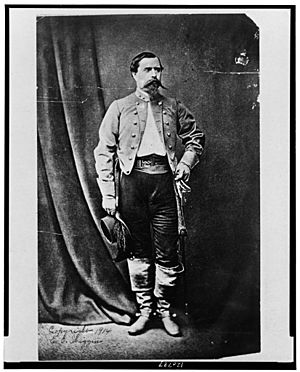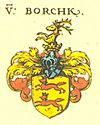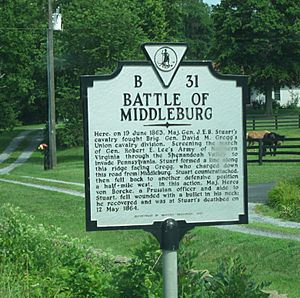Heros von Borcke facts for kids
Quick facts for kids
Heros von Borcke
|
|
|---|---|

Von Borcke in uniform, ca. 1864
|
|
| Birth name | Johann Heinrich August Heros von Borcke |
| Born | July 23, 1835 Ehrenbreitstein Fortress, Prussia |
| Died | May 10, 1895 (aged 59) Berlin, Prussia |
| Buried |
Mausoleum Von Borcke in the Old Cemetery at Giżyn, Poland
(52°56′28.1″N 15°00′05.2″E / 52.941139°N 15.001444°E) |
| Allegiance | |
| Service/ |
|
| Years of service |
|
| Rank |
|
| Unit |
|
| Battles/wars | American Civil War
|
| Awards | |
| Spouse(s) |
Madalene Honig
(m. 1867; died 1883)Tony Honig
(m. 1885) |
| Children |
|
| Relations | Sidonia von Borcke |
 Coat of Arms of the House of Borcke |
|
Johann Heinrich August Heros von Borcke (born July 23, 1835 – died May 10, 1895) was a Prussian cavalry officer and writer. He is best known for his book, Memoirs of the Confederate War for Independence. This book tells the story of his two years serving as a cavalry officer during the American Civil War. He fought for the Confederate army from 1862 to 1864.
Contents
Early Life and Education
Heros von Borcke was born on July 23, 1835. His birthplace was Ehrenbreitstein Fortress in a region called the Rhine Province. His father was Lieutenant Lippe Otto Theodor Heros von Borcke. Heros von Borcke went to school at the Franckesche Stiftungen.
Military Career
Von Borcke became a cavalry officer in the Prussian army in 1855. He served with the Guards Cuirassiers. Later, he joined the 2nd Brandenburg Dragoons until 1862. He had to leave the army because of money problems. After that, he moved to the Confederate States in 1862.
Serving in the American Civil War
When von Borcke arrived, he brought a huge Solingen sword with him. This sword became very famous during his time in the war. He soon reached Richmond, the capital of the Confederate States. On June 1, he became a captain in the Confederate army. He was assigned to Major-General J. E. B. Stuart.
Von Borcke was easy to spot on the battlefield. He was very tall and big, and he carried his extremely large sword. People started calling him the "giant in gray." General Stuart was quickly impressed by von Borcke. They became close friends. After a famous cavalry ride, General Stuart praised von Borcke. He said von Borcke showed great energy, skill, and activity.
In August of that year, von Borcke was promoted to major. The Confederate States Congress confirmed this promotion on September 19. He rode with General Stuart as his assistant during the Northern Virginia and Maryland battles. He became known for his bravery. Stuart also asked him to take the body of a fallen soldier, John Pelham, back to Richmond for burial. Pelham had died at the Kelly's Ford.
During the Battle of Middleburg, von Borcke was badly wounded. A bullet hit him in the neck. He could not fight for the rest of that year. He recovered enough to return to duty in the spring of 1864. He was present at the Battle of Yellow Tavern where General Stuart was killed. In December, he was promoted again to lieutenant-colonel. The Congress officially thanked him for his service. President Jefferson Davis then sent von Borcke on a special mission to Great Britain.
Fighting in the Austro-Prussian War
The Confederate States collapsed in the spring of 1865. The Army of Northern Virginia surrendered. After this, von Borcke went back to Prussia. He rejoined the Prussian army. He fought in the Austro-Prussian War as part of Prince Friedrich Karl of Prussia's staff. He received the Order of the Red Eagle for his courage. He married Madalene Honig and they had three sons.
Later Life
Von Borcke retired from the Prussian Army in 1867 because of his war wounds. He bought a large property at Sichts. After his father passed away, he returned to his family home in Giesenbrügge. It is said that he regularly flew the Confederate flag at his home. He published his book about the Army of Northern Virginia in 1866.
In 1883, von Borcke's wife died. Two years later, he married her sister, Tony. They named their daughter Karoline Virginia to honor Virginia, his adopted state. In 1884, he sailed back to visit the Southern United States. He met many old friends and fellow soldiers. These included Wade Hampton, William H. F. Lee, and Matthew C. Butler.
Heros von Borcke died in Berlin in 1895. He died from an infection called sepsis. This infection was caused by the bullet that had wounded him at the Battle of Middleburg in 1863. His original headstone in Giesenbrügge was destroyed during World War II. The Sons of Confederate Veterans bought a new headstone. It was put in place in 2008.
 | Jewel Prestage |
 | Ella Baker |
 | Fannie Lou Hamer |


